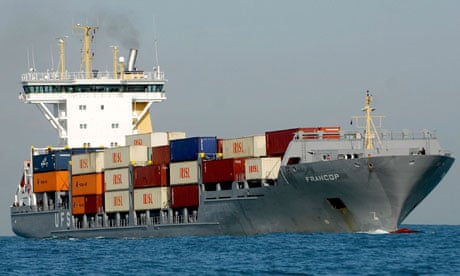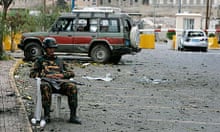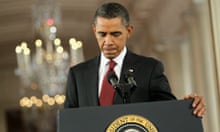The US has worked discreetly to block the supply of Iranian and Syrian weapons to the Palestinian movement Hamas and Lebanon's Hezbollah, pressuring Arab governments not to co-operate – in many cases where the requests were based on secret intelligence provided by Israel.
State department cables released by WikiLeaks show that Sudan was warned by the US in January 2009 not to allow the delivery of unspecified Iranian arms that were expected to be passed to Hamas in the Gaza Strip around the time of Israel's Cast Lead offensive, in which 1,400 Palestinians were killed.
US diplomats were instructed to express "exceptional concern" to the Khartoum authorities. Saudi Arabia, the United Arab Emirates, Oman and Chad were informed of the alleged Iranian plans and warned that any weapons deliveries would be in breach of UN resolutions banning Iranian arms exports.
Sudan's foreign minister told a US official his government's formal response would be that it was not permitting the import of weapons from Iran – only to be told that "a simple regurgitation of Sudan's previous denial would be unfortunate".
Months later the media reported that in mid-January Israeli planes mounted a long-range bombing attack on an arms convoy in Sudan's Red Sea province. The Sharq al-Awsat newspaper quoted a US official as saying Sudan had been warned in advance about the shipment.
State department documents record that Khartoum then privately accused the US of carrying out two air attacks in eastern Sudan: one in January 2009, with 43 dead and 17 vehicles destroyed, and another on 20 February, with 45 dead and 14 vehicles destroyed. "We assume that the planes that attacked us are your planes," a senior Sudanese official said. The US embassy in Khartoum then sought clarification from Washington. "Should this potentially explosive story somehow leak to the sensationalistic Sudanese press," the cable said, "it could very well turn our security situation here from bad to worse."
Explaining the political background to the confrontation, the head of Sudan's intelligence and security service, Salah Ghosh, told US diplomats of his government's frustration over Washington's support for Israel during the Gaza war. US actions would "calamitously increase support for violent extremism and [push] Hamas into an alliance with Iran", he warned.
In March 2009, Jordan and Egypt were informed by the US of new Iranian plans to ship a cargo of "lethal military equipment" to Syria with onward transfer to Sudan and then to Hamas. Host nations were requested to require that the flights land for inspection or deny them overflight rights. It is not known whether any deliveries went ahead.
In April Egypt's interior minister, General Habib al-Adly, was described in US cables as being behind the dismantling of a Hezbollah cell in Sinai as well as "steps to disrupt the flow of Iranian-supplied arms from Sudan through Egypt to Gaza".
At the end of that month Egypt's intelligence chief, General Omar Soleiman, told US officials Egypt was "succeeding" in preventing Iran from funnelling financial support to Hamas. "Egypt had sent a clear message to Iran that if they interfere in Egypt, Egypt will interfere in Iran, adding that EGIS [Egyptian intelligence service] had already begun recruiting agents in Iraq and Syria," Soleiman said.
In June Binyamin Netanyahu, Israel's prime minister, told US officials there was "a steady flow of Iranian weapons to Gaza through Sudan or Syria and then by sea", though "Egypt's performance in stopping the tunnels [into Gaza] improved after Cairo understood that the Iranian arms pipeline is a direct threat to Egypt as well".
Iran, a Mossad representative told a US delegation in late 2009, "is very creative in finding ways to transfer weapons systems to its proxies". It was widely reported in February 2010 that Mahmoud al-Mabhouh, a senior Hamas official who was assassinated in Dubai by suspected Mossad agents, had been the key weapons procurement link between the Palestinian organisation and Iran.
Only rarely do the US cables show evidence of direct Israeli requests to the US to block arms deliveries, probably because they would be highly classified. But in one bilateral meeting in Tel Aviv in 2009 a senior state department official noted "most requests to third countries to deny arms transfer overflights are based on Israeli intelligence. Additional information/intelligence from the government of Israel would ensure greater co-operation".
In February 2010 Israeli military intelligence informed the US that Syria "intended to imminently transfer" Scud-D ballistic missiles to Hezbollah, warning of a "new level of concern" on the northern border if the transfer went ahead. The Israelis requested that any demarche be delivered before the arrival in Washington of their defence minister, Ehud Barak, to avoid the impression "that the US and Israel collaborated to uncover and thwart the transfer". Three days later the US warned Syria that it would be a "strategic miscalculation" to provide the Lebanese group with these weapons.
President Assad was informed of US concerns by the undersecretary of state, William Burns. But the Syrian leader "bluntly stated that he knew of no new weapons systems going to Hezbollah … despite disturbing and weighty evidence to the contrary".
Syria's deputy foreign minister, Faisal Miqdad, countered that the message showed that "the US has not come to a mature position [that would enable it] to differentiate between its own interests and Israel's". But US allies in the west and the Arab world were told bluntly: "These are US concerns. We are not carrying somebody else's 'water' on this issue" – a clear reference to Israel.
Evidence of earlier US interest in blocking arms deliveries to Hezbollah and Hamas can be seen in secret cables dating from June 2006. Jordan's general intelligence directorate chief, General Muhammad Dahabi, told the assistant secretary of state, David Welch, that he had recently met the head of Iran's foreign intelligence service, who complained that Jordan had publicised Hamas attempts to smuggle weapons via Jordan to the West Bank.
Dahabi later told the Americans that Jordan had refused a Syrian request for an overflight involving a suspected weapons shipment to Hezbollah, triggering an angry complaint from Damascus. In July 2007 Dahabi told a US delegation: "Syria is the very lung through which al-Qaida breathes".
Syrian spy chief tells all
General Ali Mamlouk, director of the general intelligence department, told Daniel Benjamin that Syria had been more successful than the US and other countries in fighting terrorism because "we are practical and not theoretical", according to a leaked embassy cable.
The trick was to infiltrate terrorist groups. "In principle, we don't attack or kill them immediately. Instead, we embed ourselves in them and only at the opportune moment do we move." As a result scores of terrorists had been detained and hundreds prevented from entering Iraq, though some were still slipping through.
"By all means we will continue to do all this, but if we start co-operation with you it will lead to better results and we can better protect our interests," Mamlouk concluded.





